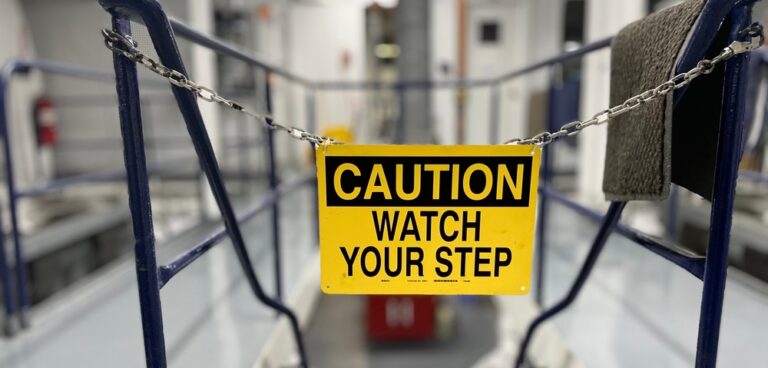Every employer has a duty of care to their employees, which means that they have a legal responsibility to assess and anticipate risks that workers may face, and to take whatever action is necessary to mitigate and reduce the chances that an accident could occur.
Businesses that fail to uphold this responsibility can face serious consequences, but with a clear understanding of health and safety regulations in your industry, a thorough approach to risk assessments, and an effort to monitor compliance on an ongoing basis, you can keep accidents to a minimum.
Some workplaces are naturally more dangerous than others – for example, in the UK, industries like construction, agriculture and food service see the highest number of accidents each year. However, this does not mean that employers can afford to overlook the risks that workers face even in circumstances that seem relatively safe.
In fact, the most common type of accidents reported in the UK in 2021/22, across all industries, were slips, trips and falls. The injuries that workers can suffer in this type of accident range from relatively minor cuts and bruises to more serious problems like broken bones; in the most serious cases, a slip, trip or fall can result in a serious long-term or permanent condition. As such, every workplace should be alert to the risk of falls and take steps to prevent them.
Here, the expert personal injury lawyers from Clough & Willis Solicitors explain the legal consequences businesses can face when they fail to uphold their duty of care, and examine why fall prevention in particular is important to businesses of all sizes, across every industry.
Why is fall prevention important?
There are several reasons why it is important to mitigate the risk of slips, trips and falls (and, where relevant, falls from height). The first is simply that this type of accident is one of the most common that occurs in UK workplaces.
According to statistics published by the Health and Safety Executive (HSE), slips, trips and falls accounted for 30% of non-fatal accidents in workplaces in 2022, while a further 8% of the total were falls from height. With 61,713 accidents self-reported by businesses during that year, this means that there were more than 18,500 slips, trips and falls – a staggeringly high number, given that organisations have a responsibility to prevent these accidents wherever possible.
This is not just a moral responsibility, but a legal one, and the consequences can be extremely serious. If your business does not address a risk – for example, by inadequately signposting a slippery surface, not using wet floor signs where necessary, or failing to clean up a spill within a reasonable timeframe – and this results in an injury to a worker, site visitor or member of the public, you may be found legally liable for the accident and the injury. This means that the injured party has the legal right to claim compensation from you, and you may face legal penalties such as fines, or worse.
From a business perspective, it is also important to remember that an injury will affect productivity and cause practical problems, all of which can be avoided when a company takes a proactive approach to risk prevention.
What should businesses do to prevent falls?
The first step that business owners should take is to ensure they understand their legal responsibilities, and any HSE guidance that applies to their industry specifically. The HSE provides a significant volume of guidance that can benefit those responsible for health and safety, and make it easier to fulfil their duties.
From there, employers should undertake careful and thorough risk assessments, bearing in mind not only the risks that are unique to their businesses, but also more general risks, including slips, trips and falls. This can allow your organisation to take action to address risks – for example, by ensuring that you have enough wet floor signs for multiple spills at the same time. You must also provide training to any employees whose duties include lifting and carrying, to reduce their risk of falling while carrying a heavy object, or working at height.
Additionally, investing in fall prevention products can help to reduce the risk of accidents significantly, and in some cases will be a legal requirement, which is another reason why awareness of your HSE obligations is vital.
Finally, businesses should monitor to make sure that workers continue to follow the policies they have put in place, and that these prove effective. Employees also have a responsibility in this area – namely, to follow the instructions they are given and to report any accidents that occur, which ensures that remedial action can be taken. By keeping health and safety at the forefront of everyone’s minds, employers can mitigate risks and prevent accidents in their workplaces.
Author: Chris Macwilliam, Partner and Head of Personal Injury, Clough & Willis Solicitors



